Jonathon Moran: My battle with depression and how I’m winning
RAW and confronting, Jonathon Moran lays bare the demons that have haunted him since his teens and how he is finally learning to find inner peace. He shares his story in the hope it helps others to seek help.
NSW
Don't miss out on the headlines from NSW. Followed categories will be added to My News.
SUICIDE sucks. I know first-hand.
Fortunately I’m here to tell you that National Suicide Prevention Day earlier this month inspired me to share part of my life story I’ve never really gone into with anyone but immediate family.
Mostly it has been the fear of being labelled weak but also some shame, but also because it’s not a place I’ve wanted to visit in my head for a long time.
When I do think of suicide, I remember my mum and sister sitting next to my hospital bed crying and blaming themselves in the emergency ward after I’d had my stomach pumped from overdosing.
WHITE AS A GHOST
I was hospitalised a few times in my late teens and early 20s.
The first time I did ‘it’, attempted suicide, I was still living at home.
It was about 9pm after dinner when everyone in the house was either getting ready for bed or watching TV.
I went outside with whatever tablets I could find in the medicine cupboard, including some pretty heavy duty meds of my mums.
I stood out in the cold Canberra winter, holding a big glass of water and swallowed as many tablets as I could at a time.
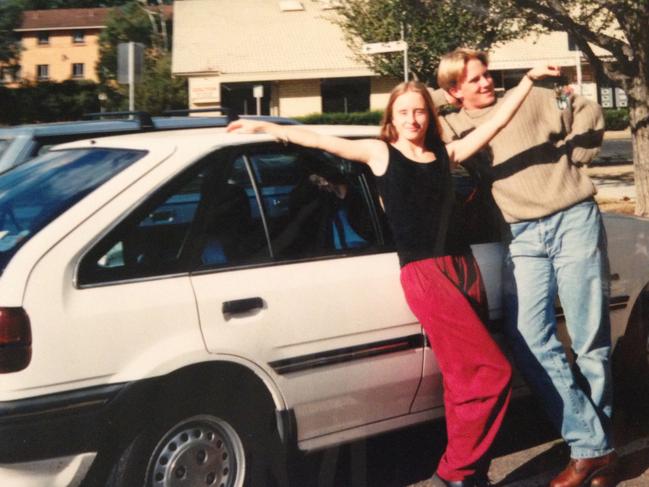
It was so cold I could see the white fog of my breath in the air.
It was initially an overwhelming sense of peace in that moment, almost a kind of euphoria. I had succumbed to the pain and let go.
Soon though the panic set in and I took another deep breath and went inside and remember my mum sitting on the couch watching television.
She looked up at me worried — I was white as a ghost and told her calmly that I’d taken a bunch of tablets. That brutal look of shock and panicked screech from my mum will sit with me forever.
I feel that guilt to this day.
Mum drove me to the hospital, where we were rushed into the emergency ward. The rest is a blur. I know they pumped my stomach and I spent the next seven days in hospital.
Vomiting charcoal wasn’t fun but in a strange way I am now at peace with my demons in a way now that means I have no regrets because it’s led me to find the strength to share this today.
All that has happened in my life makes me who I am now, flaws and all.
ALL IN OR NOT AT ALL
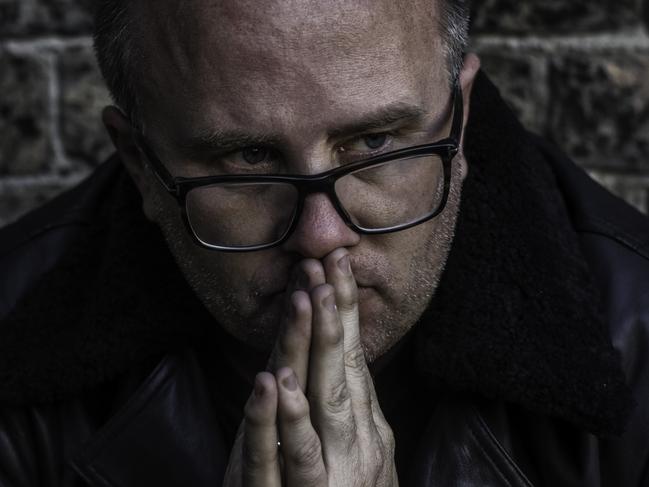
I’m not ashamed anymore and in recent months have found a voice, a purpose even — signing on as an ambassador for The Banksia Project and doing a photo shoot for photographer Glenn Marsden’s Imperfectly Perfect Campaign.
It is time for me to be vocal about my battles because I truly believe that if me sharing my story helps just one person, my job is done.
From the outside looking in I earn a good living, I’m okay looking, reasonably healthy, smart and some would say successful.
Inside, I often struggle. That struggle has changed over the years as I’ve tried different crutches to help manage my depression.
I’ve tried all kinds of drugs — cocaine and ecstasy mostly.
Sex and the desire to be wanted, validated has also been a destructive force in my life.
Alcohol was the worst because I’ve never been a one drink person. I am a drink until you can’t stand up, pass out and spew kind of guy.
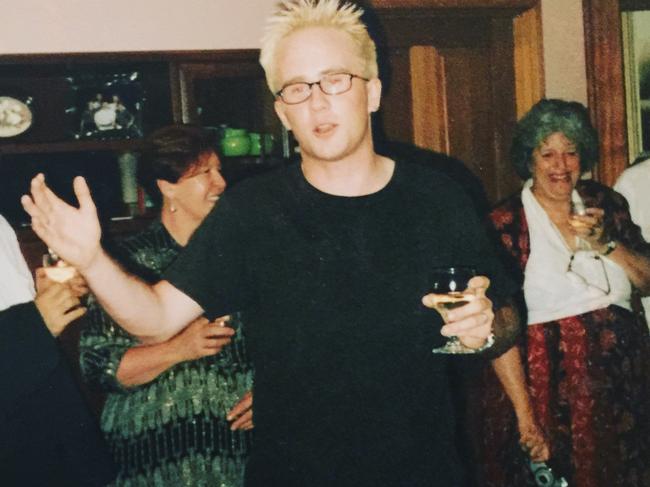
I am all in or not at all. Hangovers, the dark feeling of shame and anxiety the next day is my idea of hell.
Abusing my body was a way to escape my head, particularly when my mum died of cancer a few years back.
In the end it was better for me to give up all substances so I don’t drink at all anymore.
There are a few exceptions, like my 40th birthday in Thailand earlier this year where I had a couple of cocktails with family and close friends.
I figured that if I’ve spent thousands of dollars on psychiatrists and medication, why would I undo that for one night of fun and a few lines of coke.
We as a society are too dependent on alcohol. That’s a fact.
Having to explain that you don’t drink booze though is like telling someone you were born with two heads. People just don’t get it.
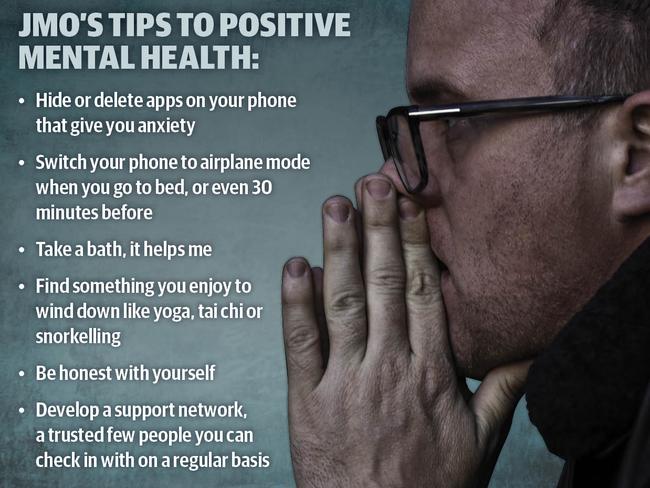
MY BRAVE MUM
When I’m smiling, that can be when I’m at my worst. I’ve grown to be very good at hiding my pain but in recent times, when asked if I am okay, I say if I am not, not for attention but because I think it is important to acknowledge and be real.
As far as we’ve come, and thank goodness mental health is truly on the table finally, society still sees depression as a weakness.
It is an overarching feeling that permeates daily life and oppresses those already suffering.
I have experienced that feeling every day since I openly declared I suffer from depression. I revealed that when a close friend and warrior Charlotte Dawson took her life in February 2014.
Charlotte and I shared similar demons — addictive personalities, dark depression and an unfortunate understanding of what it was like to be a victim of sexual abuse.
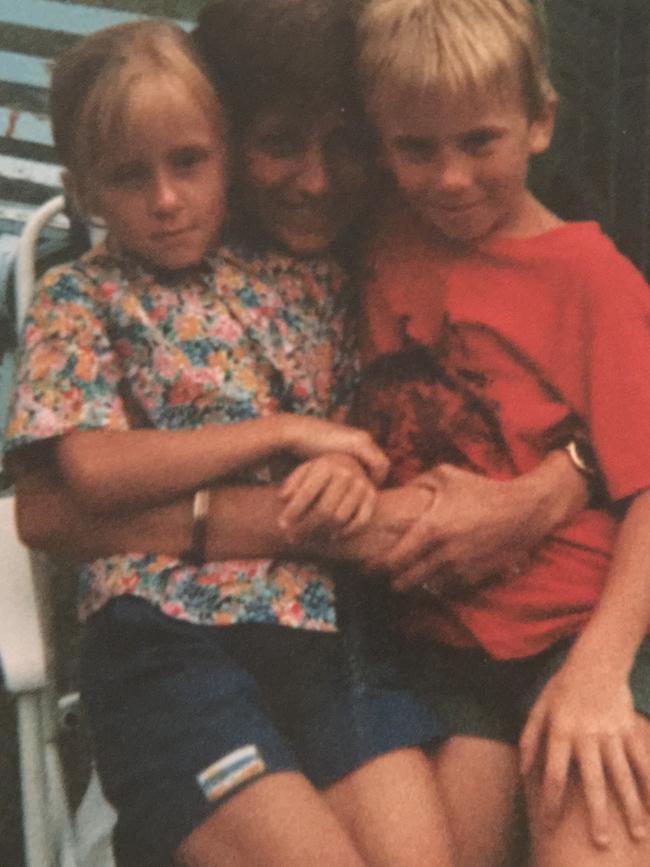

Once you admit to suffering from a mental illness, people put you in a box.
They tread carefully and whatever happens, any issues are always attributed to your illness.
You can see it in people’s eyes. It can be infuriating.
Sometimes I might be emotional on a dark day but at other times, people are just being arseholes and I am not afraid to call them out.
I saw it with my amazingly brave late mum, who was open about her battle with bipolar.
She was ruthlessly bullied by work colleagues who did not understand and thought she was weak.
I watched mum go through electroconvulsive therapy (ECT), visiting her in hospital between studying for my Year 12.
ECT scared people then and still does now.
It wasn’t something my twin sister and I shared with our friends, not because we were ashamed but because people didn’t understand. It was a tough time.
DIAGNOSED WITH DEPRESSION
I was diagnosed with severe depression in my early 20s. Since then, I’ve been told I suffer from traits of borderline personality disorder, anxiety, and post-traumatic stress disorder from being sexually abused as a kid and I will most likely be on medication for the rest of my life.
I just say depression, it is easier to explain.
I am okay with my diagnoses. It is actually quite liberating, empowering even, to reveal publicly although it has taken me a long time to get here. It helps take away the shame.
People often label suicide as selfish, which is true. It is also true that it is a very easy thing to say, trivialises the issue and basically sweeps it under the carpet.
People profoundly misunderstand the intense pain that leads someone to suicidal thoughts and to reduce that to saying someone is simply selfish demonises that person in an unfair way.
Author David Foster Wallace, who took his own life, famously described suicide as akin to standing inside a burning building.
“When the flames get close enough, falling to your death becomes the slightly less terrible of two terrors. It’s not desiring the fall; it’s terror of the flames. And yet nobody down on the sidewalk, looking up and yelling ‘Don’t’ and ‘Hang on’, can understand the jump.”
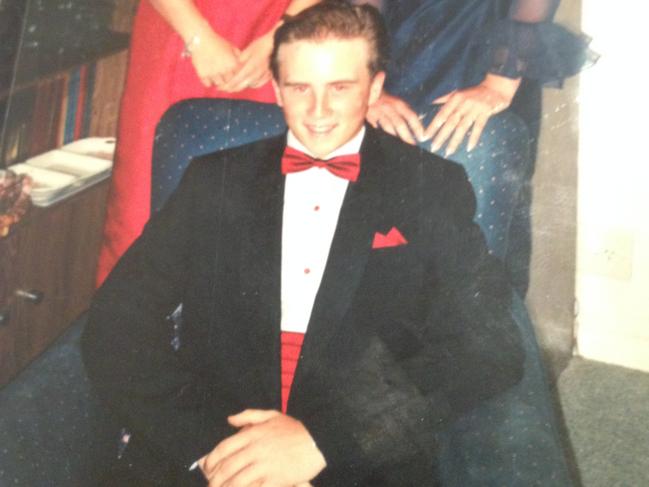
The Sunday Telegraph has been at the fore of discussion around suicide since its 2015 Can We Talk campaign.
I’ve had years of counselling and still have dark days.
The detail of my experiences in hospital isn’t important but there’s also something very brave about a person admitting they aren’t coping.
Of course, that’s not a thumbs-up to attempting suicide but if we have conversations sooner and open up the dialogue, we reduce the stigma and hopefully people will feel more comfortable admitting defeat before they do something drastic.
In the media we’ve been careful when talking about suicide as it was believed doing so would encourage copycat behaviour.
I’m not an academic but I believe firmly that when it comes to mental health, speaking up is the way to go as we’ve swept these issues under the carpet for too long.
TOXIC SOCIAL MEDIA
Social media has a lot to answer for. It is a toxic minefield of horrific bullying, narcissistic behaviour and just gross fake people.
It is the devil. It reinforces that generation of entitlement that leaves people wanting more and more of the things that are either unrealistic or unobtainable in life.
No one is ever satisfied anymore — money, power, holidaying in Europe in summer, selfies in Bali for a weekend getaway.
Where do people get the cash from? Instagram influencers who are given freebies pretending to live the dream life but it is all smoke and mirrors and it is time we as a society called bullshit.
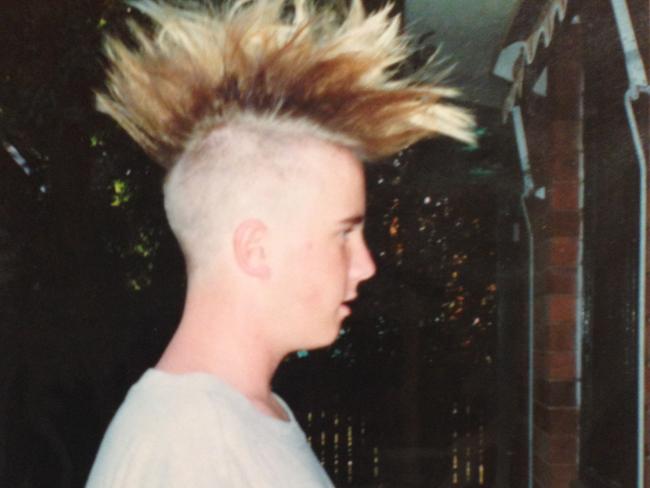
Unfortunately, social media has become part of everyday life. And for me, it is also a work tool so I can’t delete it altogether.
I’ve always struggled with my weight. And still to this day, whether I’m on the heavy side or if I’ve lost a few kgs, every time I look in the mirror I see the fat me.
I was diagnosed with body dysmorphia when I was a teen.
I’d starved myself to the point I collapsed on my weekend job and my boss called my mum to pick me up. I was 15. It was my first job.
Even though I know it is in my head, I still have these demons and I still see fat me in the mirror.
Like alcohol, I am an all or nothing guy. So when it comes to chocolate and sweets, I abstain these days. I try to, anyway.
The pressures on guys to be ripped and to look a certain way are greater than ever, even though women undeniably cop it far worse. I am speaking from my experienced.
Instagram is a fake world for people projecting fake lives.
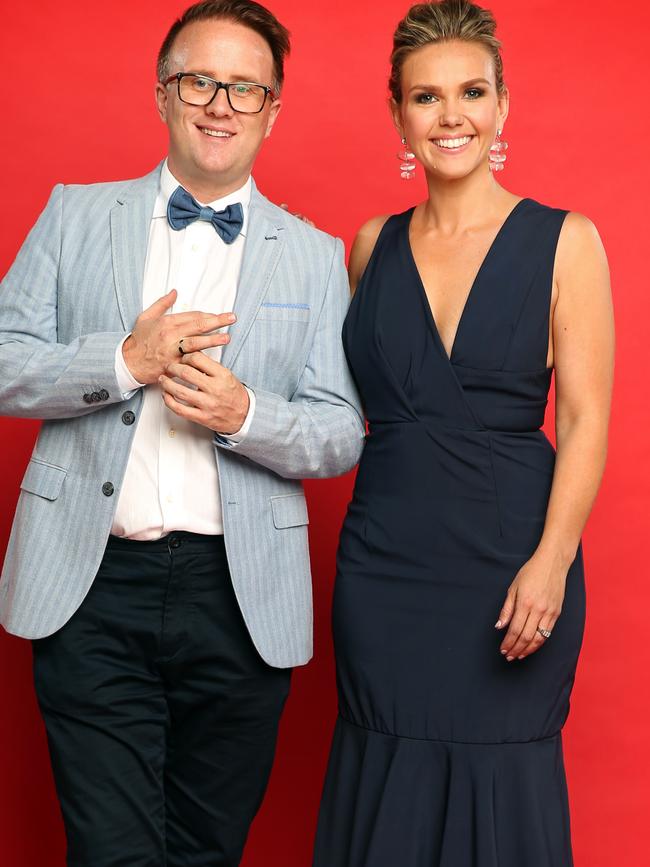
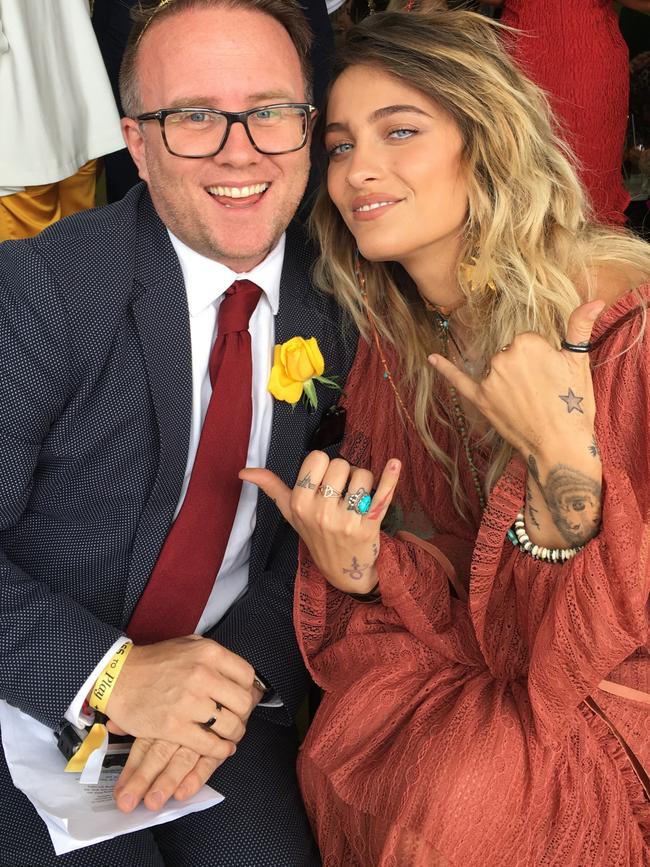
Look at those with the biggest followings on social media — they’re the ones with a gimmick or most usually a hot body where they show more of their arse, abs or boobs than their face.
It’s a terrible, sad message being sent to kids and it scares me for the future of my nieces.
We can never really switch off in life. The difference between personal and work life is negligible as we are all available 24/7.
There is no such thing as leaving work at work anymore.
I struggle with that massively.
I recently relegated my Instagram to a folder on my phone so it’s not immediately jumping at me with notifications when I look at my phone.
I also switch my phone to aeroplane mode when I go to bed to stop me checking my email, Instagram, Twitter and Facebook at 3am.
I took these steps for my mental health.
I’ve taken up yoga and meditation too, again for my health and wellbeing.
Just looking at notifications on my phone gives me anxiety.
If I feel that, what hope does my 14-year-old niece have?
Lifeline 13 11 14
.

